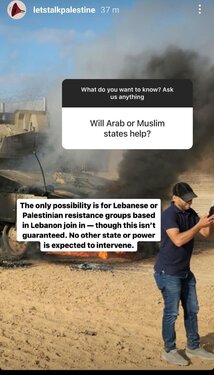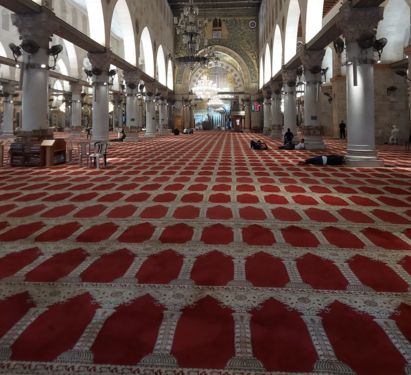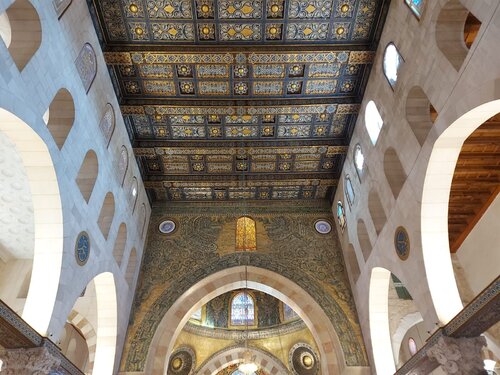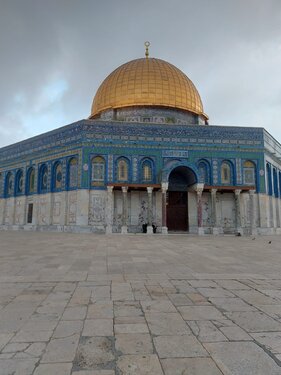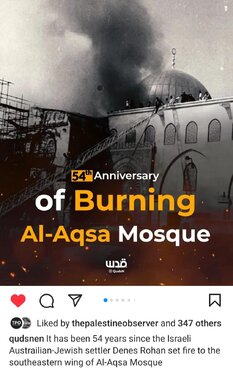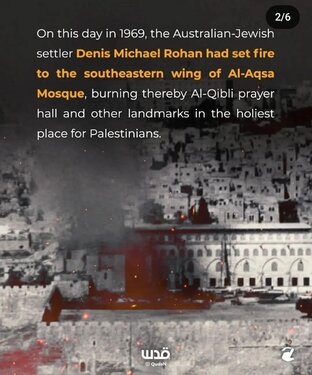-
Posts
8,434 -
Joined
-
Days Won
771
Content Type
Profiles
Forums
Events
Everything posted by ummtaalib
-
-
-
BREAKING As of 9:30 AM Jerusalem time, here is a summary of what happened: On Saturday, October 7, 2023, at 6:45 AM, alarm sirens resonated across 160 Israeli settlements, commencing from the Gaza envelope settlements and extending to Tel Aviv. Subsequently, the Palestinian Resistance launched 5,000 rockets, resulting in casualties and injuries among the settlers. Members of the Resistance executed parachute landings, while others seized military vehicles and engaged in confrontations with both soldiers and settlers within the outskirts of the Gaza strip. Mohammed Dhaif, the military leader of the Al-Qass**am Brigades, declared the commencement of the 'Al-Aqsa Flood' war in a televised address. This was in response to escalating Israeli attacks on Al-Aqsa Mosque, as well as aggressions by the Occupation Forces and settlers in the West Bank The Resistance released numerous photographs depicting casualties inflicted upon Israeli soldiers and settlers, accompanied by videos showing the retrieval of some bodies to the Gaza Strip Additionally, the Resistance targeted and set fire to Israeli military vehicles, capturing military equipment and transporting it to Gaza There are anticipations of the Palestinian Resistance capturing Israeli soldiers and transferring them to Gaza. In the 'Ofakim' settlement, resistance fighters took hostages. Israeli media reported that the resistance had gained control of 'Kibbutz Baree' and the Sderot police station www.instagram.com/p/CyFyQB-N6Fp/
-
Masjid al-Qibli Located to the western most side of the compound, this grey domed masjid can accommodate 5000 people and is considered the largest masjid in Jerusalem. Originally built by Umar ibn al-Khattab, it has undergone several modifications, expansions and reconstructions having experienced several dynasties as well as two earthquakes. The Crusaders conquered Jerusalem in 1099 and renamed the Masjid as Solomon’s Temple - it was used as a palace while the Dome of the Rock was used as a church. You can still see some remnants of Christian architecture today, such as the Mihrab/Musallah of Zakariyya. However, the great Salah ad-Din had an intense yearning to regain the holy city. Ibn Shaddad mentions "the Sultan was so keen for Jerusalem that the hills would have shrunk from bearing the burden he carried in his heart." (Saviours of the Islamic Spirit, page 214) On Friday 2 October 1187, Jerusalem was recaptured and Salah ad-Din bought a magnificent wooden pulpit his uncle Nur ad-Din Zangi had designed under his orders twenty years prior. It was bought from Aleppo and erected it the masjid. Unfortunately, this mimbar was burnt down in 1969 in an arson attack by an Australian Christian Fundamentalist. Inside If you look closely at the windows (in the second picture), you can see they have been broken due to recent violence in the masjid. There is so much history overflowing in every inch of Jerusalem. Insha'Allah next week I hope to share other less-well known structures located in and around al-Masjid al-Aqsa. May Allah allow us to learn about, visit and protect the Holy Lands.
-
The Prophet (may Allah bless him and give him peace) said: One should not undertake journeys seeking to gain Allah’s reward except to three masjids: al-Masjid al-Haram, al-Masjid al-Aqsa or this masjid [the prophet’s mosque in Madina]. What exactly is al-Masjid al-Aqsa? Contrary to popular belief, al-Masjid al-Aqsa refers to the entire walled compound also known as al-Haram ash-Sharif (the Noble Sanctuary), not just the famous Qubbat as-Sakhrah (the Dome of the Rock) or Masjid al-Qibli (also known as Al-Aqsa Mosque). The compound is also home to hundreds of olive trees, a museum, madrassas, four minarets and several domes and musallas. Qubbat as-Sakhrah The Dome of the Rock was built by the Umayyad ruler Abdul Malik ibn Marwan in 691. It was originally wooden with a lead or ceramic cover and the iconic Gold dome was built almost a millennium years later during the reign of the Ottoman ruler, Sulayman the Magnificent. It is claimed that the Prophet (may Allah bless him and give him peace) stood on the rock located inside the building before being raised to the Heavens during Mi'raj. However, this is not absolutely certain. Just outside there is also a small commemorative structure called 'Dome of an-Nabi' where it is believed that the Prophet (may Allah bless him and give him peace) led all the prophets in congregational prayer on that blessed
-
From White Thread Press Assalamu ‘alaykum wa rahmat Allahi wa barakatuh, Alhamdulillah I was blessed to travel to Palestine, the land of the Prophets. It was a spiritually enlightening and awe inspiring trip, connecting us to our Islamic history. It is a place where Allah's blessings descend. From praying in the masjid wherein each prayer is worth 5,000, feeling the acceptance of duas in the chambers of Maryam, offering salams to Ibrahim, Ishaq and Yunus (upon them all be peace), we came as honoured guests and left with teary eyes. Insha'Allah over the next few weeks I hope to share my experience of visiting Palestine, discussing the historical and spiritual significance of some of the places I visited to encourage you to also visit the Holy Land. But first, Where exactly is the 'Holy/Blessed Land'? There is a difference of opinion about the boundaries of the 'Blessed Land'. Classical scholars like Ibn Kathir and al-Qurtubi consider it to be the whole area of Sham (modern-day Palestine, Jordan, Syria and Lebanon). Other scholars believe there are pockets of 'blessed land' scattered throughout the area of the modern Middle East such as Masjid al-Aqsa in Jerusalem, Masjid al-Haram in Makkah and Masjid an-Nabawi in Madina. Some say it is contiguous from Hijaz, through Sham to Egypt However, (in all opinions) there is no doubt that Masjid al-Aqsa is located within the Blessed Land. Mention in the Qur'an: It is clearly and directly mentioned in Surah al-Isra that Masjid al-Aqsa as well as its surrounding area has been blessed by Allah Most High for mankind to reap spiritual and material benefit: سُبْحَـٰنَ ٱلَّذِىٓ أَسْرَىٰ بِعَبْدِهِۦ لَيْلًۭا مِّنَ ٱلْمَسْجِدِ ٱلْحَرَامِ إِلَى ٱلْمَسْجِدِ ٱلْأَقْصَا ٱلَّذِى بَـٰرَكْنَا حَوْلَهُۥ لِنُرِيَهُۥ مِنْ ءَايَـٰتِنَآ ۚ إِنَّهُۥ هُوَ ٱلسَّمِيعُ ٱلْبَصِيرُ Glorious is He who made His servant travel by night from al-Masjid al-Haram to al-Masjid al-Aqsa whose environs We have blessed, so that We let him see some of Our signs. Surely, He is the All-Hearing, All-Seeing. Surah Ma'idah mentions when Musa (upon him be peace) left Egypt with Bani Isra'il he said: يَـٰقَوْمِ ٱدْخُلُوا۟ ٱلْأَرْضَ ٱلْمُقَدَّسَةَ ٱلَّتِى كَتَبَ ٱللَّهُ لَكُمْ وَلَا تَرْتَدُّوا۟ عَلَىٰٓ أَدْبَارِكُمْ فَتَنقَلِبُوا۟ خَـٰسِرِينَ O my people! Enter the holy land which Allah has destined for you; and do not turn back, lest you should turn losers. Mufti Taqi Usmani mentions in the footnotes of his new edition of The Noble Qur’an: Meaning with Explanatory Notes that 'the reference here is to Syria and Palestine that were occupied by Amalekites, and after Pharaoh drowned, the Israelites were directed to liberate those lands from them.' Mention in Hadiths The Prophet ﷺ said: "Allah has blessed what lies between al-Arish (in Egypt) and the Euphrates and has made Palestine particularly holy." [Kanz al-Ummal] Zaid ibn Thabit reports that the Prophet ﷺ said: “How blessed is Sham!" The Companions asked, “Why is that?” The Messenger ﷺ replied, “I see the angels of Allah spreading their wings over Sham." Ibn Abbas added, “And the Prophets lived therein. There is not a single inch in al-Quds (Jerusalem) where a Prophet has not prayed or an angel not stood.” [Tirmidhi, Ahmad] May Allah allow us all to visit the Blessed Land and reap benefit from the blessings therein.
-
Short Summary His arrival heralded a new dawn for the whole universe after a long dark night: The noblest of Allah’s creation, the leader of His creation, and the Seal of His Messengers. None from Allah’s servants are equal to him. He won hearts through his character. He captivated souls through his love. And He made mankind cry out of yearning for him. He is Muḥammad b. ʿAbdillāh: Allah’s final and most beloved Messenger, sent as a mercy to mankind till the Last Day. He was the best of the best. His worship was the best. His character and interactions with others were the best. His family relations were the best. His leadership was the best. Read this free eBook to learn more about this great man. This FREE E-Book contains: His Iman & Love for Allah His Sublime Character The Messenger: A Grateful Servant The Messenger: The Murabbi The Messenger: A Family Man Loved By Allah’s Creation The Messenger & His Love for The Ummah Do We Truly Love Our Prophet ﷺ? Download, read, print and share with family and friends Loving-Allahs-Beloved-by-Life-With-Allah.pdf
-
By Shaykhul-Hadīth, Hadrat Mawlānā Muhammad Saleem Dhorat dāmat barakātuhum The smartphone has become an inseparable part of our day-to-day lives. From within the confines of the home to every region and sector of the outside world, people are seen immersed in the smartphone, yet very few contemplate the negative effects this small gadget is having on their lives. The smartphone undoubtedly has its benefits like efficient worldwide communication, quick internet access, timely news updates, simple navigation, easy online shopping, fast bank transfers, etc. However, an intelligent person does not only focus on the benefits of an item and become oblivious of its harms. Therefore, it is necessary to ponder over the negative impact the smartphone is having on our lives. A few moments of contemplation will help us realise the extent of harm it is causing us. Worldly Harms What makes the smartphone particularly dangerous is its irresistible attraction which disconnects us from our surroundings and prevents us from enjoying and benefitting from the many worldly blessings Allāh ta‘ālā has created for us. Let us cite a few examples: When taking a walk in the park, we remain focused on our mobile phones and consequently fail to appreciate the beautiful scenery around us. When we sit to partake of a meal, we are unable to truly enjoy the food because our eyes are glued on the smartphone throughout the meal. This silent addiction does not allow us to have a peaceful sleep either. Hours are spent engrossed in the smartphone, resulting in frequent late nights. It has also become a norm to keep the smartphone by the bedside during the night and check it whenever it buzzes. The subsequent lack of quality-sleep has a negative impact on our health and reduces our productiveness during the day. Social Harms This terrible addiction has also affected our social lives and disconnected us from those who are important to us. A family may be seated together in the same room, yet each person will be in their own world, occupied in some form of a pastime on the smartphone. They fail to even acknowledge each other’s presence and do not communicate with each other as a family ought to. When the family goes on a holiday with the intention of spending quality time together, they fail in their objective, as ‘quality time’ is given to the smartphone. In the home, the young children often run to the father with much love hoping to be entertained, but he is too busy on his phone and says to them, ‘Go to your mother, I am busy.’ They then go to their mother who is also busy on her phone and says, ‘Go to your father, I am busy.’ When the children get fed up and cause a nuisance or ‘disturbance’, the parents ‘solve the problem’ by tossing a smartphone into their hands! This has a detrimental effect on the spiritual, physical and mental development of our children. Husband and wife even quarrel and reach a break-up point in their marriage due to this smartphone. Spending an excessive amount of time on it and sometimes even cheating on one’s spouse whilst on it, results in rights being violated and hearts broken. Guests who we are commanded to honour are left neglected. Frequent attention to the smartphone whilst in front of them makes them feel unwanted and dishonoured. Spiritual Harms Along with the many worldly and social harms, there are many spiritual harms of the smartphone too. It has proven to have a negative impact on a very important character-trait of a believer, trustworthiness in fulfilling responsibilities. Those of us who have an average 9am-5pm job are required to work for the full duration of their contracted hours and not engage in any personal activity. This is because the employer who is paying us, has essentially bought our time of us; hence doing anything in that time besides fulfilling the task set by the company would be a breach of trust and tantamount to stealing. Unfortunately, many people during their contracted work hours frequently scroll through their messages on social platforms or keep up to date with the latest news and fall short in diligently fulfilling their duty. Another great spiritual harm of the smartphone is the unprecedented levels of futile activities we engage in. This leaves us with no time for ‘ibādah and has an effect on our spirituality. Very few people can claim to have never engaged in some futile activity on the smartphone. A Qārī sāhib who is spiritually associated to me once informed me that for two or three months, he had been missing his daily tilāwah and adhkār. I asked him to ponder over the reason, upon which he immediately said, ‘I already know the reason. It is the smartphone. When I first bought it, I used it carefully for a while. One day somebody sent me a videoclip of a debate. I liked it and thus started watching other debates on YouTube, which lead me into a spiral of pointlessly watching videos and wasting hours of my time.’ He would spend so much time on YouTube that he would not have any time left for his tilāwah and adhkār. I said to him, ‘You know the problem and the solution, hence there is no need to ask me for guidance’. He got rid of the smartphone and once again became punctual with his daily practices. An even greater harm of the smartphone is that it ultimately lands us into sinful activities. Safeguarding the eyes and ears becomes extremely difficult as one does not always have control over what appears on the screen. If an obscene image happens to pop up on the screen, many people do not have the spiritual strength to resist and look away, thus they take pleasure from it. When this happens repeatedly, the nafs searches for more and falls prey to the many different forms of indecent and shameful activities available on the smartphone. This results in sins like masturbation, looking at obscene material, developing illicit relationships and eventually fornication. The same smartphone used to commit sins is then used to publicise them. Youngsters will shamelessly boast of their sins to friends on social media platforms. This decreases their chances of being forgiven and could be more detrimental than the sin itself. If one claims that the smartphone has not affected their spirituality because it has not led them to sin, then they will not be able to deny that in some way or another it has affected the sincerity in their worship and good deeds. Just as sins are publicised on the smartphone, it has now become extremely common to publicise good deeds too. People are seen more worried about taking selfies of themselves than pleasing their Creator, when present in blessed places like the Haramayn Sharīfayn, engaged in some worship like du’ā or in some relief work. Feeling the need to ‘capture’ the moment, they do not realise that they are actually wasting a precious moment of their lives due to falling prey to riyā (ostentation). A huge harm caused by the smartphone is that it constantly occupies the mind. Every notification will urge one to immediately check his phone, even if he is engaged in ṣalāh, recitation of the Qur’ān or dhikr. In fact, even in the Houses of Allāh we are unable to connect to Allāh, as we remain connected to the smartphone by way of conversing on it, through messaging or just browsing. Unfortunately, this engrossment has deprived us of the solitude of mind required to connect to Allāh ta‘ālā even in blessed places and during worships. Another great harm caused by the smartphone is that it has deprived many from the blessed environment of the masjid and the company of the ‘Ulamā, Mashāyikh and the pious. Many people tend to think that merely listening or watching clips about Din on the smartphone in the comfort of their homes is sufficient for spiritual progress. The reality is that without the company of the ‘Ulamā, Mashāyikh and the pious one can never truly excel in spirituality and acquire the correct understanding of Dīn. If the smartphone does not become an impediment from the gatherings of the ‘Ulamā and Mashāyikh and the masjid environment, it will make many of us violate the etiquettes of these blessed gatherings and also of the masjid. Our attention would be clearly more centred towards the smartphone than the esteemed ‘ālim who is sat before us. This constitutes disrespect to an ‘ālim and disinterest to the knowledge of Dīn which becomes a means of deprivation from Dīnī knowledge. Weigh out the Pros and Cons After numerating various harms of the smartphone, let us implement a maxim we learn from the Glorious Qur’an. Allah ta‘ālā states regarding alcohol, The maxim is that when there is both harm and benefit in something, one must let go of the benefit and save oneself from the harm. An example is alcohol. It is prohibited despite having benefits due to the harm it causes. The smartphone is no different. It also has both harms and benefits. In fact, the harms of the smartphone outweigh its benefits, and therefore we should avoid it. Safeguarding Ourselves In order to safeguard ourselves from the harms of this gadget, we should ideally get rid of it altogether. A simple mobile phone which is used mainly for calls and text messages will suffice for our communicational needs. In the modern age, this may seem old fashioned, but it is wiser to save oneself from so many obvious harms than to worry about being labelled ‘old fashioned’. The smartphone is not as necessary for the majority of us as we believe it to be, and getting rid of it would only bring about many benefits which we ourselves will witness and appreciate. For those who are genuinely in need of a smartphone, such as those whose work requires them to check emails regularly, business owners who need certain apps on the phone, etc., strict measures should be put in place to regulate and limit our usage of the smartphone: 1. Stipulate certain hours of the day when the smartphone will not be used. For example, 10pm until the Fajr ṣalāh, whenever we sit to eat, when at work or in a class, when in the Masjid, etc. In these times, we should never look at the phone. 2. Set time limits for the tasks that genuinely need to be carried out on the smartphone. For example, 20 minutes to check the news, 30 minutes to check and reply to emails, etc. An alarm should be set to signal the end of the set time. 3. Apps are now available which disable us from using social media or YouTube beyond a set amount of minutes per day or week, at a cost of a few pounds per month. If this saves us from wasting precious moments of our lives, then it is something we should seriously consider. 4. Only use the smartphone when there is a genuine need. This will save us from engaging in anything that will lead to lā ya’nī (futile activity) or disobedience to Allāh ta‘ālā. 5. Avoid using the smartphone in private. Use it in open areas such as the sitting room where family members pass by regularly. This will save us from looking at shameful and immoral things on the phone. May Allāh ta‘ālā enable us to recognise what is good for us and what is bad, and save us from all tools of lā ya’nī and sin. May Allāh ta‘ālā grant us the courage and tawfīq to get rid of the smartphone; and if it is absolutely necessary, then may He enable us to keep it under control, and not let it control us. Āmīn. Extracted from Riyādul Jannah, Vol. 32 No. 7, July 2023 © At-Tazkiyah
-
Q. I have seen a post that mentioned that the use of Tasbeeh counters and Tasbeeh beads to count zikr is an innovation (Bid’ah) and one must only use the fingers. Is this true? (Question published as received) A. Both methods of counting Zikr, on fingers or using a Tasbeeh (rosary) are correct. Using a Tasbeeh, beads, or stones to help one with counting Zikr is supported by various narrations. Sayyiduna Saad bin Waqqas Radhiyallahu Anhu narrated that he was with Rasulullah Sallallahu Alayhi Wa Sallam when he visited a woman who was using date seeds or pebbles to make Zikr. Rasulullah Sallallahu Alayhi Wa Sallam guided her to a form of Zikr that was superior to the Zikr she was making but did not condemn or reprimand her use of the date seeds/pebbles. [Tirmizi #3568] Shamsud Deen Safeeri Rahimahullah records an amazing practice of Sayyiduna Abu Hurairah Radhiyallahu Anhu. He states, “From the virtues of Abu Hurairah Radhiyallahu Anhu was that he would recite Subhanallah 12 000 times daily. He would mention that the blood money paid for a human life is 12 000 Dirhams. Hence he would recite Subhanallah 12 000 times daily as a ransom for himself from the Fire. He had a string with 2000 knots (for counting) and he would not sleep until he completed this amount. [Sharhul Bukhari Lis-Safeeri 1: 354] In the past, people used stones, beads and strings as an aid in making Dhikr. In today’s times, digital counters and its like will also be permissible. Hence, using a Tasbeeh/Tasbeeh counter may not be classified as a Bid‘ah. Rather it is not only permissible but it is recommended for those whom it will serve as an aid and a reminder to make Zikr. And Allah Ta’ala Knows Best Mufti Moosa Salie Mufti Taahir Hansa (The answer hereby given is specifically based on the question asked and should be read together with the question asked. Islamic rulings on this Q&A newsletter are answered in accordance to the Hanafi Fiqh unless otherwise stated.) Fatwa Department Jamiatul Ulama (KZN) Council of Muslim Theologians
-
There was once a person whose body would always exude the fragrance of the most exotic musk and perfume. A friend one day asked him, “What is this wonderful fragrance I always smell on you? You must be spending a lot of money on musk if you apply it so often!” The person replied, “By Allah! Never have I purchased musk nor have I ever applied it!” His friend was astonished and asked, “Then where does your fragrance come from?” Not keen to answer the question, he said to his friend, “Why are you asking me?” His friend explained, “I hope that Allah Ta‘ala will let me benefit in some way by what you will tell me.” On his friend’s coaxing and urging, he eventually narrated the following: In my youth I was a very handsome lad. My father was a merchant and I would generally spend my time with him. One day, an old woman came to him and purchased some cloth. As she did not have the money with her to pay for it, she asked my father if he would send me along to her home where I would collect the money. My father agreed. Hence, I proceeded with her until we finally stood before a grand, palatial home. The old woman ushered me into a stunning courtyard and as I entered, my gaze fell on a beautiful young girl who was seated atop a raised seat on a silken cushion. The instant she saw me, she was dazzled by my beauty and immediately demanded that I join her on her seat. I staunchly refused. Instead of bringing her to her senses, my rejection only incited her to get down and come to me. Then, in a fit of infatuation, she began pulling and tugging me towards herself. I was in a genuine predicament. Thus in order to escape from her embrace, I asked her if I could use the toilet. Although impatient, she acceded and shouted for her slaves who guided me to the toilet. I entered the toilet where I relieved myself into my hands. Not wasting a moment, I smeared the filth over my body, clothing, and face. When I exited the toilet, the eagerly awaiting girl was greeted by the sight and smell of not a handsome youth but a person literally covered in human waste! The flames of her passion were, at once, thoroughly doused and she screamed to her servants in horror and disgust, “This is a madman! Throw him out immediately!” I happened to have only one dirham with me. On leaving, I purchased some soap and thereafter went to the river where I cleansed my body and clothing of the filth. When I was done, I went back to my father and did not tell him a word of what had transpired. When I went to sleep that night, I saw a dream in which a handsome man with an excellent fragrance came to me. I asked him who he was to which he replied that he was Jibreel (‘alaihis salaam). He said to me, “Allah Ta‘ala has sent me to give you the glad tidings of Jannah and to reward you with some of its perfume because of the extent to which you went to avoid falling into sin.” He then passed his hands over my face, body and clothing and departed. When I awoke the next morning, I smelt an exquisite fragrance which, to this day, still perpetually wafts from my body. (At-Targheeb wa Tarheeb lil Yaafi‘ee pg. 165) Lessons: 1. The pious youngster was prepared to go to the extreme of covering himself with filth and mess in order to avoid falling into sin. We, on the other hand, make an all-out effort to ensure that we fall into sin and filth – resulting in us making a mess of our lives. 2. A person who leaves sin for the pleasure of Allah Ta‘ala will enjoy rewards in both this world as well as the Hereafter. 3. A true Muslim detests sin even more than he detests filth and faeces. 4. A Muslim is prepared to make any sacrifice necessary in order to keep his link of love with Allah Ta‘ala intact. Al-Haadi.org
-
سُبْحَانَ اللّٰهِ وَبِحَمْدِهِ ، عَدَدَ خَلْقِهِ ، وَرِضَا نَفْسِهِ ، وَزِنَةَ عَرْشِهِ ، وَمِدَادَ كَلِمَاتِهِ (3x) Allah is free from imperfection and all praise is due to Him, (in ways) as numerous as all He has created, (as vast) as His pleasure, (as limitless) as the weight of His Throne, and (as endless) as the ink of His words. Subḥāna-llāhi wa bi ḥamdih, ʿadada khalqih, wa riḍā nafsih, wa zinata ʿarshih, wa midāda kalimātih. Juwayriyyah b. al-Ḥārith (raḍiy Allāhu ʿanhā) reported: “The Prophet ﷺ left (my home) in the morning as I was busy in performing the dawn prayer. He came back in the forenoon and found me sitting there. He ﷺ asked: ‘Are you still in the same position as I left you?’ I replied in the affirmative. Thereupon the Prophet ﷺ said: ‘I recited four phrases three times after I left you. If everything that you have said today was put in the scales, [the above] would outweigh it.’” (Muslim 2140, Abū Dāwūd 1503) Brief Commentary • We begin this dhikr by saying ‘Subḥānallāh’, a phrase which glorifies Allah through negating any deficiencies in Him. • We follow this up by saying ‘wa bi-Ḥamdih’. Through this phrase, we praise Allah in a complete manner which encompasses praising Him for (1) all His perfect qualities, and (2) for all His blessings which He showers upon us. • We then combine the tasbīḥ and ḥamd with four phrases ― each one increasing the magnitude of this tasbīh and hamd in terms of: (1) quantity (2) quality and (3) weight. “As numerous as all He has created” • When we say we glorify Allah and praise Him by the quantity of His creation, we are not saying that we are praising Allah this many times, as it is inconceivable that someone can say I am praising Allah x number of times without actually doing so an x number of times. Rather we are saying that He deserves to be glorified and praised in this quantity and more, because His creation is constantly increasing. In other words, He deserves to be glorified and praised an infinite number of times. “(As vast) as His pleasure” • “(As vast) as His pleasure” refers to the quality of the praise. We are praising Allah not only by an amount (quantity) befitting Him, but also in a manner pleasing to Him (quality). • Allah is the Most Noble, and He only accepts and is pleased with good things. Therefore, when we glorify Allah and praise Him by His pleasure, we are saying that He deserves to be glorified and praised in the best manner possible as He is only pleased with that which is good. “(As limitless) as the weight of His Throne” • As the Throne of Allah is the heaviest and greatest of Allah’s creation, we are saying that Allah deserves the largest and weightiest form of glorification and praise. • The Prophet ﷺ said, “The heavens (universe) in comparison to the footstool (Kursī) are but like a ring in an empty desert; and the example of the footstool (Kursī) in comparison to the Throne of Allah is like this ring in the empty desert” (Ibn Ḥibbān 361). “(As endless) as the ink of His words” • “As numerous as all He has created” dealt with the quantity of this praise; “(As vast) as His pleasure” dealt with the quality of this praise; and “(As limitless) as the weight of His Throne” dealt with the weight of this praise, so Allah deserves to be glorified and praised in the largest, best way possible, an infinite number of times. • The “(As endless) as the ink of His words” encompasses all three aspects as Allah’s words are infinite, they are the best of words, and they carry the most weight. Allah describes their greatness in the Qur’ān: “If all the trees on earth were pens and the ocean (were ink), refilled by seven other oceans, the Words of Allah would not be exhausted. Surely Allah is Almighty, All-Wise” (31:27). Action Points • This particular dhikr is very short yet carries immense rewards. Although Juwayriyah (raḍiy Allāhu ʿanhā) was remembering Allah for a long duration, the Prophet ﷺ said this one dhikr outweighed everything she had said. The difference between the two is that this dhikr powerfully highlights the greatness that Allah deserves. It opens up the heart to contemplate over Allah, through His Attributes, Words, Creation, and specifically His Throne. This deep reflection enables the dhikr to emanate not only from the tongue but also from the depths of the heart. • The more present your heart is when remembering Allah, the greater the reward will be. • Never miss out saying this dhikr three times every morning, and ensure you always say it with contemplation to maximise the rewards and benefits you receive. Feel awe in your heart as you praise the Lord of the Throne and the worlds. • This ḥadīth teaches us the importance of why we should hold on tightly to the Sunnah adhkār. Juwayriyah (radiyallahu ʿanhā) remembered Allah for a long duration, but the four phrases specified by the Prophet ﷺ would ensure far greater reward than the dhikr she had been engaged in all morning, even though they require much less time to utter. source
-
“And there are some people who sell themselves (i.e. they spend everything of theirs) in pursuit of the pleasure of Allah. And Allah is exceptionally kind to the servants.” (Surah Baqarah v207) Sayyiduna Suhaib bin Sinaan (radhiyallahu anhu) is commonly known with the title “Roomi”, although he was not from Rome. The reason for him being called this is that when he was young, the Romans had captured him during one of their attacks on the Persian territory and they had enslaved him. He thus grew up among them. Thereafter, an Arab tribe, the Banu Kalb, purchased him from them and brought him to Makkah Mukarramah. Abdullah bin Jud‘aan subsequently purchased him and set him free. When Rasulullah (sallallahu ‘alaihi wasallam) was blessed with nubuwwah, Sayyiduna Suhaib (radhiyallahu ‘anhu) accepted Islam. He was among the very early Muslims, with only thirty some odd people entering into the fold of Islam before him. Like the other weak Muslims, Sayyiduna Suhaib (radhiyallahu ‘anhu) too was tortured and persecuted by the disbelievers of Makkah Mukarramah. A few days after Rasulullah (sallallahu ‘alaihi wasallam) had left Makkah Mukarramah for Madeenah Munawwarah, Sayyiduna Suhaib (radhiyallahu ‘anhu) quietly left as well. However, as he left, some youngsters of the Quraish prevented him from leaving. He thus devised a plan. The entire night he pretended as though he had a stomach ailment. The disbelievers fell for this trap and went to sleep leaving him unguarded, as they felt that he would be unable to travel due to his sickness. He thus left Makkah Mukarramah quietly. However, as soon as the disbelievers realised that he had absconded, they followed him until they eventually caught up with him. Sayyiduna Suhaib (radhiyallahu ‘anhu) pulled out his quiver and addressed them saying, “By Allah, you know very well that I am a better archer than you. By Allah, you will not reach me until I have killed one person among you with each arrow (I possess). Thereafter, I will fight you with my sword until I am killed.” Sayyiduna Suhaib (radhiyallahu ‘anhu) then presented a more lucrative option to them saying, “If (however,) you desire wealth, I will guide you to the place where my wealth is buried (in Makkah Mukarramah).” The disbelievers happily agreed to this option, and Sayyiduna Suhaib (radhiyallahu ‘anhu) informed them where his wealth was buried. They thus allowed him to continue with his journey of Hijrah and they returned to Makkah Mukarramah. When Sayyiduna Suhaib (radhiyallahu ‘anhu) reached Rasulullah (sallallahu ‘alaihi wasallam), who was in Qubaa at the time, he exclaimed “O Abu Yahya! The deal has earned great profits (i.e. rewards in the Hereafter).” He was quite surprised that Rasulullah (sallallahu ‘alaihi wasallam) had come to know of this incident and expressed his surprise saying, “O Rasulullah (sallallahu ‘alaihi wasallam), no one (who knew of my story) reached you before me. It could only have been Jibreel (‘alaihis salaam) who informed you.” It was because of this incident, the following verse was revealed, “And there are some people who sell themselves (i.e. they spend everything of theirs) in pursuit of the pleasure of Allah. And Allah is exceptionally kind to the servants.” (Surah Baqarah v207) (Al-Bidaayah wan Nihaayah vol. 3, pg. 185 & vol. 8, pg. 106 and Usdul Ghaabah vol. 2, pg. 461) Lessons: 1. The Sahaabah (radhiyallahu ‘anhum) made the great sacrifice of leaving behind their homes, businesses, belongings, family and friends and everything else for the protection and propagation of Deen. They in turn enjoyed many bounties from Allah Ta‘ala and experienced great ease and comfort from their challenges and persecutions. If we also make ‘Hijrah’, i.e. abandon all types of vice, sin, wrongs, and anything which amounts to the disobedience of Allah Ta‘ala, we will also enjoy great bounties, comforts and blessings from the side of Allah Ta‘ala. 2. Sayyiduna Suhaib (radhiyallahu ‘anhu) gave up all his wealth for the sake of protecting his Deen, because he had understood the importance of Deen and the temporary nature of material possessions. Conversely, when a person does not understand this reality, and thus makes material his priority and Deen a secondary issue in his life, he will be prepared to ‘sell’ his Deen, merely to earn a little extra wealth. Hence, he will not mind engaging in interest bearing transactions and thereby waging war with Allah Ta‘ala. For him to lie, cheat, usurp another person’s right, etc. will not be a serious issue, since his priority is the acquisition of material and the amassing of wealth. UswatulMuslimah Jamiatul Ulama (KZN) Council of Muslim Theologians
-
Life under brutal occupation continues.... Special needs boy shot Israeli occupation forces shot and injured Islam Nofal, a Palestinian boy with special needs and severe psychological disabilities, near the southern military checkpoint in the city of Qalqilya in the occupied West Bank. www.instagram.com/p/CwHmk3-IKmb/ Killings continue 13 Palestinians have been killed by Israeli occupation forces and settlers in the occupied West Bank and Jerusalem so far in August. www.instagram.com/p/CwCccIzIuym/?img_index=1 Destruction of homes during raids (2 days ago) Destruction left behind Israeli occupation forces after besieging and blowing up a house in which a Palestinian man was inside before fatally shooting him during an assault on the occupied West Bank city of Jenin, this morning. www.instagram.com/p/CwCbNG8IPxL/?img_index=1 During this morning’s assault on Jenin city, Israeli occupation forces blow up a bakery owned by a Palestinian man. During the assault, a 32-year-old Palestinian man was also fatally shot by Israeli occupation forces with live bullets. Settler violence/terrorism Um Safa is as an example of Israeli settlers' rampages in the West Bank. In June, the settlers broke into the village, shot live fire, and torched homes with people inside. The Israeli soldiers were there to secure them. The immediate goal was to erect an outpost by Zvi Bar Yosef on the village’s lands, while at a broader context, it is an act that serves the regime of Jewish supremacy. Apartheid. www.instagram.com/p/CwDXSFGouds/ In the meantime... An Emirati appears dancing with an Israeli at a ceremony amid deepening normalization ties between the two countries. (could be fake) www.instagram.com/p/CwBFP98IZzL/ And... Has Israel-Saudi Arabia normalization approached? www.instagram.com/p/CwBKsGwoR4Q/?img_index=1
-
الصلاة على النبي (اَللّٰهُمَّ صَلِّ عَلَىٰ مُحَمَّدٍ وَعَلَىٰ آلِ مُحَمَّدٍ…) (10x) Send ṣalawāt on the Prophet ﷺ. O Allah, honour and have mercy upon Muhammad and the family of Muhammad,,, Allāhumma ṣalli ʿalā Muḥammad wa ʿalā āli Muḥammad… Abū al-Dardā (raḍiy Allāhu ʿanhu) narrates that the Messenger of Allah ﷺ said: “Whoever sends ṣalāh upon me 10 times in the morning and 10 times in the evening will receive my intercession.” (Ṭabarānī: al-Muʿjam al-Kabīr 6357) Brief Commentary • Sending abundant ṣalawāt upon the Messenger ﷺ is a manifestation of our love, reverence and obedience to him. We can never repay the Prophet ﷺ for what he did for us. Ibn al-Qayyim (raḥimahullāh) writes, “If a person was to send ṣalawāt upon the Prophet ﷺ equivalent to his every breath, he will still not have fulfilled his right.” • Allah ﷻ Himself sends ṣalāh on our beloved Prophet ﷺ, and so do His Angels. Allah ﷻ says, “Indeed, Allah and His angels send blessings (ṣalāh) to the Prophet. O you who believe, invoke ṣalāh upon him, and send your salām (prayer for his being in peace) to him in abundance” (33:56). • Sending ṣalawāt has immense blessings and rewards. These include: When you send ṣalāh on the Prophet ﷺ once, Allah sends 10 ṣalāhs upon you. Likewise, Allah records ten good deeds for you, erases ten sins from you, and raises you ten degrees in status. Through the blessings of the ṣalawāt, your needs are sufficed and your sins are forgiven. The Best Wording For Salawat The best wording for the ṣalawāt is the ṣalāh ibrāhimiyyah: اَللّٰهُمَّ صَلِّ عَلَىٰ مُحَمَّدٍ وَّعَلَىٰ اٰلِ مُحَمَّدٍ ، كَمَا صَلَّيْتَ عَلَىٰ إِبْرَاهِيْمَ وَعَلَىٰ اٰلِ إِبْرَاهِيْمَ ، إِنَّكَ حَمِيْدٌ مَّجِيْدٌ ، اَللّٰهُمَّ بَارِكْ عَلَىٰ مُحَمَّدٍ وَّعَلَىٰ اٰلِ مُحَمَّدٍ ، كَمَا بَارَكْتَ عَلَىٰ إِبْرَاهِيْمَ وَعَلَىٰ اٰلِ إِبْرَاهِيْمَ ، إِنَّكَ حَمِيْدٌ مَّجِيْدٌ O Allah, honour and have mercy upon Muḥammad and the family of Muḥammad as You have honoured and had mercy upon Ibrāhīm and the family of Ibrāhīm, indeed, You are the Most Praiseworthy, the Most Glorious. O Allah, bless Muḥammad and the family of Muḥammad as You have blessed Ibrāhīm and the family of Ibrāhīm, indeed, You are the Most Praiseworthy, the Most Glorious (Bukhārī). اَللّٰهُمَّ صَلِّ [O Allah, honour and have mercy], O Allah, have mercy upon Muḥammad and praise him in the lofty assembly. The ‘lofty assembly’ refers to the elite angels who are close to Allah ﷻ. Salāh also means ‘honour him’ i.e. honour him in the world by elevating his mention, granting victory to his dīn and preserving his sharī‘ah; and honour him in the hereafter by rewarding him abundantly, accepting his intercession on behalf of his ummah and granting him the loftiest station of glory (maqām mahmūd). وَعَلَىٰ آلِ مُحَمَّدٍ [And upon the family of Muḥammad ﷺ], This phrase could be a reference to, (1) His family (2) His followers. By invoking ṣalāh on his followers, you are honouring the Messenger ﷺ by honouring those who are dear to him. بَارِكْ [Bless], Bārik is derived from barakah, and linguistically has two meanings, (1) to be firm and continuous and (2) to grow and increase. Thus, it is similar to stating, “O Allah continue to bless and honour Muḥammad ﷺ and his followers. Increase him and his followers in every form of good. Bless him in the mission that he came with and make his legacy universal.” حَمِيْدٌ [The Most Praiseworthy], Allah ﷻ is worthy of all praise in His Essence, His Attributes and His Actions. He also praises His praiseworthy slaves. One of His greatest blessings is that He allowed His creation to praise Him. مَّجِيْدٌ [The Most Glorious], His glory and greatness know no ends. He is the Most Generous and bestows endless favours. He is Noble and Exalted. The glory of Allah ﷻ refers to His beautiful actions combined with nobility. Why Do the Salawat End With These Two Specific Names? In asking Allah (ʿazza wa jall) to bestow ‘ṣalawāt’ on His beloved ﷺ, you ask Him to praise him, honour him, and elevate his mention. Thus, it is befitting that you ask ‘al-Ḥamīd’ (The Most Praiseworthy) and ‘al-Majīd’ (The Most Glorious) – the real and ultimate source of praise and glory – to increase the Messenger ﷺ in praise and glory. Action Points • Realise that all the good deeds you do in this world and all the good you will receive in the hereafter is due to the Prophet ﷺ conveying his message to mankind. Thus, you owe it all to him and are indebted to him ﷺ. • On the Day of Judgement, when humanity will be distraught, utterly terrified and thirsty, you will be desperate to receive the intercession of the Prophet ﷺ. Recite this dhikr every morning and evening so that you will be fortunate enough to receive his intercession inshaAllah. • Sending ṣalawāt ten times in the morning and the evening is the minimum amount. Try to exceed this number on a daily basis, especially on Friday. If you want to be close to Allah’s Messenger ﷺ, then send as much ṣalawāt as possible, as he ﷺ told us that the closest of people to him on the Day of Judgement will be those who send the most ṣalawāt upon him. • Read up on the biography of the Prophet ﷺ .This will increase the love and respect you have for him ﷺ, and will allow you to recite the ṣalawāt with a present heart. livewithallah
-
An essential part of the culture of Islam is for each individual to consider himself/herself as part of the same body. 1. Sayyiduna Nu’man ibn Bashir (radiyallahu anhuma) reports that Nabi (sallallahu alayhi wa sallam) said: “The believers in their mutual mercy, love and compassion are like a single body, when one limb is in pain the rest of the body joins in insomnia, fever and restlessness.” (Sahih Bukhari) 2. Rasullah (sallallahu ‘alayhi wa sallam) said: “The believers are like a building, they support and strengthen/support each other.” (Bukhari, Muslim) The current sad state of the Ummah both; physically as well as spiritually should trouble every reciter of the kalimah Laa ilaha illallah, Muhammadur Rasulullah. My Honourable Teacher; Al-‘Allamatul Muhaddith, Shaykh Muhammad ‘Awwamah (hafizahullah) often discusses this, and laments on our appalling negligence of such an important aspect of what Shaykh labels as ‘part of the Islamic culture’ and ‘the character of Islam’. In other words, Shaykh (hafizahullah) means to say, every Muslim ought to feel the pain of the Ummah. Inspiring anecdotes Shaykh (hafizahullah) recently quoted the following incidents in this regard, to illustrate the noble character of our predecessors. 1. Bishr Al-Hafi (rahimahullah) Once someone visited him on a cold night and saw him shivering, whilst wearing only his lower wrap, despite having additional clothing in his possession which were hanging on a rack inside his room. When he was asked about this he replied: ‘There are many poor people [in the Ummah], and I am unable to provide them all with clothes. Therefore I am doing this so that I can sympathise with them by bearing the cold like they are.’ (Fathul Qadir) 2. Sa’id ibn ‘Uthman Al-Kalbi (rahimahullah) Once on one cold night, Imam Sa’id ibn ‘Uthman Al-Kalbi (rahimahullah) – a Maliki Hadith Scholar- cried the entire night. When he was asked about this he replied: ‘I thought of the [plight of the] poor people in the Ummah of Muhammad (sallallahu’alayhi wasallam) on a night like this, so I cried out of pity for them.’ Imam Sa’id (rahimahullah) passed away in the year: 295 A.H. (Tartibul Madarik) Note: When noting this incident in his copy of the mentioned reference, Shaykh (hafizahullah) labelled it as: ‘among the rare incidents on the brotherhood of Islam.’ 3. Sariy As-Saqaty (rahimahullah) On one occasion, all the shops in the market burned down, besides the one with whom Sariy As-Saqaty (rahimahullah) had an investment. When the news reached him, he said: ‘Alhamdulillah’. [which is exactly what any Muslim would say, out of gratitude for his investment being protected by Allah. However, Sariy (rahimahullah) later realised that he was more concerned about his own interest, instead of the rest of the Muslims who lost their livelihood due to the fire.] For the next thirty years he rebuked himself over this! He says: ‘I am reciting istighfar (seeking forgiveness) for the past thirty years for saying Alhamdulillah [on that occasion].’ (Siyar A’lamin Nubala) The above are indeed unique forms of ‘feeling the pain’ of others, and sympathising with them. There are several more such incidents about our recent seniors as well, like that of Hazrat Shaykh Moulana Muhammad Zakariyya Al-Kandehlawi (rahimahullah), Hazrat Moulana In’amul Hasan saheb (rahimahullah), Shaykh ‘Abdul Fattah Abu Ghuddah (rahimahullah) and others, which I would like to share when time permits. In fact My Honourable Teacher; Al-‘Allamatul Muhaddith, Shaykh Muhammad ‘Awwamah (hafizahullah) himself, is an example of this; as whenever he receives sad news of the suffering of the Ummah, one can easily notice the extreme effect it has on him. At times, Shaykh (hafizahullah) falls ill due to the effect of such news. My Beloved Father (rahimahullah) would often mention that if we were truly concerned about the current sad state of the Ummah, we would not even be able to eat our meals. In the latter years of his life (rahimahullah), as the suffering of the Ummah increased throughout the globe, he would say: ‘How can we feast, or enjoy our meals when our own brothers and sisters are suffering so much?!’ My Honourable Teacher; Al-‘Allamatul Muhaddith, Shaykh Muhammad ‘Awwamah (hafizahullah), after citing the above incidents, quoted the following couplet to illustrate that the quality of feeling the pain of the Ummah is an essential trait for every Muslim. It is ‘part of the character (akhlaq) of Islam’ and that its absence is a warning sign of our decline: The existence of every nation is by virtue of their morals. When they lose their morals, they themselves will be destroyed. May Allah Ta’ala inspire us all to sympathise with the less fortunate of the Ummah, in whichever form possible; be it through du’a, moral and financial support, or in the manner mentioned in the incidents above. Ml Muhammad Abasoomar Darul Hadith Research Center
-
For the last few weeks we have been looking at the deeper meanings of the following hadith about having haya (modesty) before Allah: “Be modest before Allah, as is his due…. Modesty before Allah means protecting the head and all that is in it; and protecting the stomach and all that is inside it. Furthermore, you should remember death and decay, for one whose eyes are set on the Hereafter keeps away from worldliness. One who accomplishes all of this is one who is modest before Allah the Exalted.” Today, we will focus on the directive “remember death and decay”. Below are excerpts taken from the English translation of Mufti Muhammad Salman Mansapuri’s Urdu title ‘Allah Ta’ala se Sharam Kijiye’, edited by Andrew Booso to produce the title ‘The Path to Paradise’: It is related in the Hadith that another requisite for modesty before Allah Most High is constant mindfulness of death and the events of the Hereafter. The maintenance of such a state prevents one from sinning and draws one towards [performing] acts of worship, as it makes us indifferent to this world. Death is an undeniable reality, while all other issues are subject to dispute. People differ on even the concept of God, Messengers and the working of the universe; however, no one can dare deny death. Even the best devices and resources premised on science and technology cannot help avoid death. The Qur’an asserts: “To every people is a term appointed. When their term is reached, they cannot cause a delay for even an hour, nor can they advance it” (7:34); and “Wherever you are, death will find you out, even if you are in towers built up strong and high!” (4:78). Yet people appear to be blind to this evident truth, and do not like to mention it in public. If death is mentioned at some happy occasion, it irks such people, because they consider it to be unpleasant. Advantages of Remembering Death Allamah Suyuti, in Sharh as-sudur, reports that the ulama are of the opinion that he who often recalls death is blessed by Allah with a number of virtuous states. They develop the habit of making immediate repentance and seeking Allah’s forgiveness if they commit a lapse, because they dread dying without having made repentance for any wrong actions. They gain a heart full of contempt, because they are not afflicted by greed. Their state of contemptment fills them with true happiness and tranquillity. Consequently, such a person knows how to live moderately and correctly and is not fixated with amassing more and more. They experience joy through worship, with full devotion and concentration; and delight that cannot be captured in words. This state is achieved because he thinks he may not get more time to worship, and hence he focuses on his acts of worship; and because he achieves a conviction in Allah rewarding good deeds. Disadvantages of Forgetting Death Allamah Suyuti also outlines the dangers of not recalling death frequently. One develops the habit of deferring repentance, until death overcomes one whilst in the state of heedlessness. One becomes increasingly greedy, unsatisfied with what one has; so one spends one’s whole life simply forming endless plans until one dies. One becomes lethargic in performing acts of worship because one fails to realise that one will be answerable [for one’s conduct]. Furthermore, it does not occur to such a person that their failure to worship will entail a humiliation that makes wordy insults suffered in this life seems as wholly insignificant. When being asked to identify the wisest person, the Prophet (may Allah bless him and give him peace) quipped: “He who remembers death most makes the best preparation for the Hereafter. He is indeed wise.” May Allah allow us to be well-prepared for our deaths and grant us contemptment in the life of this world. Source: White Thread Press
-
(Haatim Asamm (rahimahullah) On one occasion, after Haatim (rahimahullah) had spent thirty years in the company of his shaikh and teacher, Shaqeeq Balkhi (rahimahullah), Shaqeeq (rahimahullah) asked him, “What have you learnt (from me) since the time you have accompanied me?” Despite spending such a lengthy period of time in his company, Haatim (rahimahullah) replied that he had learnt (only) six lessons. When Shaqeeq (rahimahullah) enquired as to what these lessons were, Haatim (rahimahullah) explained them as follows: First Lesson: “I have seen everyone in doubt (and concerned) when it comes to the matter of (their) sustenance, whereas I have relied on Allah Ta‘ala (when He says), “And there is no moving creature on earth, but that Allah is fully responsible for the providing of its sustenance.” (Surah Hood ; V:6) Thus, I have realized that I am (also) one of these creatures (whose sustenance Allah Ta‘ala has taken care of). Hence, I did not engross myself in something which my Rabb has taken responsibility of for me.” On hearing this, Shaqeeq (rahimahullah) said, “Excellent! What is the second (lesson)?” Second Lesson: Haatim (rahimahullah) continued, “I have noticed that every person has a friend with whom he shares his secrets and complaints. I thus thought of looking for someone I could befriend, (only to realize that) every friend and brother only remains till death. I therefore decided to take up a friend who will be with me (even) after death. Hence, I befriended good deeds so that they may remain with me till the reckoning, they may cross the siraat (bridge over Jahannam) with me, and they may keep me firm in front of Allah Ta‘ala.” To this Shaqeeq (rahimahullah) responded, “Correct! What is the third (lesson)?” Third Lesson: Haatim (rahimahullah) said, “I have seen that everyone has an enemy. I decided to see who my enemy (really) was. (I thus realized that) the one who backbit me is not my enemy, nor is the one who took something from me. Rather, my enemy is the one who commands me to disobey Allah Ta‘ala when I am in His obedience. I had seen that this is Iblees and his army, hence I have taken them as an enemy. I have declared war with them, placed the string on my bow and positioned my arrow (towards them), not allowing him (Iblees) to get close to me.” Shaqeeq (rahimahullah) exclaimed, “Excellent! What is the fourth (lesson)?” Fourth Lesson: Haatim (rahimahullah) explained, “I have realized that there is someone who pursues every person (and gets hold of them) one day (or another). I have seen that this (person) is the Angel of Death. Hence, I have freed my soul for him so that the day he comes, I will not have to hold (my soul) back from him and I will proceed (happily) with him.” On hearing this, Shaqeeq (rahimahullah) said, “Excellent! What is the fifth (lesson)?” Fifth Lesson: Haatim (rahimahullah) further mentioned, “I pondered over the creation (and realized that) I love some and hate others. (However,) the one whom I love has not given me (anything in order for me to like him), and the one whom I hate has not taken anything from me (which would cause hatred for him in my heart). I thus (fell into retrospect and) enquired (from myself), ‘On what basis have you developed this?’ I then came to realize that I had developed this because of jealousy. Hence, I have shunned jealousy from my heart and I (now) love everyone. (Now,) whatever I dislike for myself, I dislike for them (as well).” To this Shaqeeq (rahimahullah) responded, “Excellent! What is the sixth (lesson)?” Sixth Lesson: Haatim (rahimahullah) concluded by saying, “I have noticed that everyone has a house and abode while I have realized that my (real) abode is the grave. So whatever good I am able to carry out, I send it forward (to the Hereafter) for myself so that I may furnish my grave (with it), for indeed if the grave is not furnished, living in it will not be possible.” After hearing these lessons, Shaqeeq Balkhi (rahimahullah) instructed Haatim (rahimahullah) thus, “Hold firm to these six qualities for you will not require any other knowledge besides this.” (Hilyatul Awliyaa vol. 6, pg. 316) NB: Imaam Ghazaali (rahimahullah) has mentioned another version of this incident, which contains eight lessons. (Ihyaau ‘Uloomid Deen vol. 1, pg. 277) One of the gems of wisdoms of Haatim (rahimahullah) were, “A calamity in Deen is (far) worse than a worldly calamity. However, when my daughter passed away, more than ten thousand people consoled me, whereas when I missed a salaah in congregation, not a single person consoled me.” (Mufeedul ‘Uloom pg. 268) Lessons: 1. In order for a person to acquire the true qualities of imaan and become a practical Muslim, it is extremely important that he adopts the company of the pious and remains under their guidance for a lengthy period of time. The Sahaabah (radhiyallahu ‘anhum) became the best of the creation after the Ambiyaa (‘alaihimus salaam) because of being in the company of Rasulullah (sallallahu ‘alaihi wasallam). In a like manner, Haatim (rahimahullah) became who he was by remaining in the company of his shaikh, Shaqeeq (rahimahullah), for 30 long years and learnt these great important lessons from him. 2. When a person is convinced about the temporary nature of this world and the everlasting nature of the Hereafter, he understands the great importance of Deen and the insignificance of the material world. He will therefore be able to manage a calamity affecting his material possessions, whereas a loss to his Deen will be unbearable. uswatulmuslimah.co.za
-
By Shaykhul-Hadīth, Hadrat Mawlānā Muhammad Saleem Dhorat dāmat barakātuhum At a time when the sanctitry of the Qur’ān is being openly violated, Muslims should resolve to adhere to the following: 1. Recite the Glorious Qur’ān on a daily basis. 2. Understand its beautiful message by attending the durūs (lessons) of the Qur’ān delivered by reliable ‘ulamā. Similarly, study authentic commentaries of the Glorious Qur’ān under their guidance. 3. Give its illuminating teachings place in your life so that others can appreciate its finest guidance. 4. Frequently make mention of its beautiful message and teachings to both Muslims and non-Muslims alike. 5. Distribute leaflets and booklets which cover different aspects of its teachings far and wide. 6. Supplicate to Allāh ta‘ālā, beseeching Him to pardon our sins and to grant us assistance and protection from all evil. 7. Exercise patience and express your displeasure remaining within the boundaries of our beautiful Dīn.
-
Muharram: The Month of Allah FREE EBOOK: Short Summary During certain blessed moments and places, we are given a wealth of opportunities to seek the mercy, love and blessings of Allah. These moments, particularly the ‘sacred months’, have been specially selected by Allah as the best times to worship Him and attain His proximity. The month of Muharram is another blessed month; a chance for us to begin the New Islamic Year with good deeds, righteous intentions and praiseworthy resolutions. This FREE E-Book contains: The Four Sacred Months The Magnitude of Actions Start the Year on a Good Note Why is Muharram Special? What to Do in Muharram ʿAshura’: The 10th of Muharram Virtues of Fasting on ʿĀshūrā’ Fasting on the 9th and 11th Download, read, print and share with family and friends Muharram-The-Month-of-Allah-by-Life-With-Allah.pdf Muharram-The-Month-of-Allah-by-Life-With-Allah.pdf (lifewithallah.com)
-

Information on the Islamic Months
ummtaalib replied to ummtaalib's topic in General Islamic Articles
The Islamic Calendar Introduction Living in the West, we are all familiar with the Gregorian calendar, the years, the months, even the dates which are significant to people of other faiths. The real question is, how many of us are familiar with the Islamic Calendar? Can we say that we know the significant dates in Islam or the names of the months? In fact, how many of us know which Islamic month or year we are currently in? We all know when it is Ramadaan and maybe Dhul Hijjah, but what about the other months? Consider the following: A child reaches adulthood in Islam on their 15th Islamic birthday if they haven’t experienced any of the natural signs Our Zakaat is payable once every Islamic Year Our obligatory fasting begins on the 1st of Ramadaan and ends on the 1st of Shawwaal Our obligatory pilgrimage (Hajj) takes places between the 8th and 12th of Dhul Hijjah Bearing the above in mind, as Muslims, it is imperative for us to familiarize ourselves with our Islamic Calendar. The Origin of the Islamic Calendar On one occasion, Abu Musa al-Ashari radiyallahu anhu wrote a letter to Umar radiyallahu anhu, when he was the Ameer ul-Mu’mineen. In the letter, he mentioned that the letters of Umar radiyallahu anhu reach him, but the letters were not dated. Hence, in the 17th year of Hijrah, Umar radiyallahu anhu gathered the Sahabah radiyallahu anhum to discuss how to set a date, in other words, how to fix the Islamic calendar. The first point of discussion was when should the Islamic calendar start, i.e., what should be the first year. Some of the opinions were as follows: From the birth of Rasulullah sallallahu alayhi wa sallam From the time Rasulullah sallallahu alayhi wa sallam received Prophethood From the time of the Hijrah - Migration to Madinah Munawwarah From the demise of Rasulullah sallallahu alayhi wa sallam Regarding setting the date from the birth of Rasulullah sallallahu alayhi wa sallam, Umar radiyallahu anhu didn’t like this opinion as this would resemble the Christians. Regarding setting the date from the demise of Raslullah sallallahu alayhi wa sallam, Umar radiyallahu anhu didn’t prefer this either, as the passing away of Rasulullah sallallahu alayhi wa sallam was a blow to the Ummah. After the discussion, Umar radiyallahu anhu came to the decision that the Islamic calendar should commence from the Hijrah. The reason being that the Hijrah marked the beginning of the rise and honour of Islam. The Sahabah radiyallahu anhum unanimously agreed with his opinion. The First month Now that the first year had been determined i.e. After the Hijrah, which month should be the first in the Islamic calendar? If analogical reasoning was used, the first month should be Rabi ul Awwal as this was the month in which Rasulullah sallallahu alayhi wa sallam migrated to Madinah Munawwarah. However, the actual intention for migration was made by Rasulullah sallallahu alayhi wa sallam in the month of Muharram. In the 13th year of Prophethood, the Ansar (from Madinah) had taken the pledge of allegiance with Rasulullah sallallahu alayhi wa sallam on the 10th of Dhul Hijjah. At the end of Dhul Hijjah, the Ansar returned to Madinah Munawwarah after completing Hajj. A few days later, in the month of Muharram, Rasulullah sallallahu alayhi wa sallam made the intention to migrate to Madinah Munawwarah and granted permission to the Sahabah t to also migrate. Therefore, it was decided that the first month of the Islamic calendar should be Muharram. This was the opinion of both Uthman radiyallahu anhu and Ali radiyallahu anhu. Other Sahabah radiyallahu anhum suggested that the year should start with the month of Ramadan, however Umar radiyallahu anhu said it should be the month of Muharram, as this is the month in which the pilgrims return from Hajj. The Sahabah radiyallahu anhu unanimously agreed with his opinion. (Source: The Islamic Calendar) -
Muharram: The Month of Allah During certain blessed moments and places, we are given a wealth of opportunities to seek the mercy, love and blessings of Allah. These moments, particularly the ‘sacred months’, have been specially selected by Allah as the best times to worship Him and attain His proximity. From among these sacred months, we recently witnessed the month of Dhul Ḥijjah. We are yet again fortunate to witness another blessed month; a chance for us to begin the New Islamic Year with good deeds, righteous intentions and praiseworthy resolutions. The Four Sacred Months Regarding the sacred months, Allah said in the Noble Qur’ān: “Indeed, the [ordained] number of the months according to Allah is twelve [lunar] months, [as was decreed] in the [Preserved Heavenly] Book of Allah on the day He created the heavens and the earth. Four of them are sacred. That is the upright religion so do not wrong yourselves in them.” (9:36) These four months are Dhul Qaʿdah, Dhul Ḥijjah, Muḥarram and Rajab. The Messenger of Allah ﷺ said: “The year is twelve months of which four are sacred: the three consecutive months of Dhul Qaʿdah, Dhul Ḥijjah, Muḥarram, and Rajab of Muḍar (named after the tribe of Muḍar as they used to respect this month) which occurs between Jumād (al-Ākhirah) and Shaʿbān.” (Bukhārī 4406, Muslim 1679) The specific mention of these four months does not mean that other months are not sacred, because the month of Ramaḍān is unanimously the most sacred month in the year. But these four months were specifically termed as sacred months because even the Pagans of Makkah observed their sacredness, following in the footsteps of their forefather Ibrāhīm (ʿalayhis-salām). Despite their frequent tribal battles and regular wrangling, they deemed it unlawful to fight in these months. The sacredness of these four months was established right from the day Allah created the universe. The Magnitude of Actions during the Sacred Months Ibn ʿAbbās (radiy Allāhū ʿanhumā) said, “The phrase ‘so do not wrong yourselves in them’ refers to all the months, then these four were singled out and made sacred – thus sins in these months are more serious, and good deeds bring a greater reward.” In regards to the phrase “so do not wrong yourselves in them,” Qatādah (raḥimahullāh) said, “Wrongdoing during the sacred months is more serious and incurs a greater burden of sin than in other months. Wrongdoing is a serious matter in any circumstances, but Allah makes whatever He wills of His commands carry more weight.” He further said, “Allah has selected the elite from His creation: from the angels He selected Messengers; from mankind He selected Messengers; from speech He selected dhikr (His remembrance); from the spaces on earth He selected the Masājid; from the months He selected Ramaḍān and the sacred months…So, venerate that which has been venerated by Allah, for the people of understanding and wisdom venerate that which Allah had venerated.” (Ibn Kathīr (raḥimahullāh)) Start the Year on a Good Note Whether it is the beginning and end of the day or the beginning and end of the year, these beginnings and ends constantly remind us of our own beginning and end. It gives us a chance to reflect and ponder on our inevitable death, make amends and firm resolutions. Ibn Rajab (raḥimahullāh) said, “(Two of the) sacred months mark an end and the beginning of the Islamic Year: therefore, whoever fasts in Dhul Ḥijjah (excluding the prohibited days) and in Muḥarram has ended and started the year in worship. It is thus hoped that the entire year will be recorded as worship, as whoever starts any action with worship and ends it in worship, will be considered to have been in a state of worship between both of these times.” Why is Muharram Special? Along with being from among the sacred months, Muḥarram has other characteristics which are exclusive to it. They include: 1. The only month known as the ‘Month of Allah’ The Messenger of Allah ﷺ described Muḥarram as the “Month of Allah”. (Muslim 1163) The virtue and honour of this month can be attested to by the fact that it is the only month attributed to the name of Allah. A virtue which is exclusive to it. Ibn Rajab said, “Such an attribution is only made by Allah to the elite of His creation, such as the attribution of the Prophets to Himself as His slaves, and the attribution of the House (Kaʿbah) and the Camel to Himself.” 2. The best month to fast after Ramaḍān The Messenger of Allah ﷺ said, “The best fasting after Ramaḍān is the sacred month of Allah (Muḥarram).” (Muslim 1163) Ibn Rajab (raḥimahullāh) said, “The above ḥadīth makes it clear that the most virtuous optional fasts after Ramaḍān are the fasts of Muḥarram. And given that Allah attributed fasting, amongst all acts of worship, to Himself [saying, “It is Mine, and I Myself will give reward for it.”] it was suitable that this month, which is also ascribed to Allah, be selected for this particular form of worship. 3. It contains within it the Day of ʿĀshūrā’ The Messenger of Allah ﷺ said: “Fasting the day of ʿĀshūrā’, I hope Allah will expiate thereby for the year that came before it.” (Muslim 1162) For the virtues of ʿĀshūrā’, click here. What to Do in Muharram Below are a few things which you can do to make the most of this blessed month: Make duʿā’, especially while fasting. The Messenger of Allah ﷺ said, “There are three prayers that are not rejected: the prayer of a father for his child, the prayer of the fasting person and the prayer of the traveller.” (Tirmidhī 1905) To learn how to make du‘ā’ along with the du‘ās from the Qur’ān and Sunnah, download our free publication ‘I Am Near’. Recite and reflect over the Qur’ān. Make realistic targets which best suit your commitments, but aim to recite the Qur’ān daily. This may be a full chapter or even a few pages. Along with recitation, take time out to reflect and ponder over the message of the Qur’ān. Do dhikr abundantly. Make an intention to learn the Sunnah adhkār, especially the morning and evening adhkār, the adhkār after ṣalāh and of sleeping and the adhkār for general actions. Download a free copy of ‘Daily Adhkār’. Give in charity. The Messenger of Allah ﷺ said, “Spend in charity and do not count it, lest Allah counts it against you. Do not hoard it, lest Allah withholds from you.” (Muslim 1029) May Allah make this year our best year and the days of this year our best days; both individually and collectively as an Ummah. Āmīn. Source
-
The Messenger of Allah (may Allah bless him and give him peace) stated: “Every religion has a special characteristic, and the special characteristic of Islam is haya.” But what exactly is haya? Haya is an Arabic word that is often inadequately translated as ‘modesty’ and most people confine this to mean dressing appropriately in public, not speaking out of turn or even just staying quiet at all times. This is a great injustice to the concept of haya which holds a central place in Islam and is one of its salient features. The most comprehensive definition of haya I have come across has been mentioned by Shaykh Saleem Dhorat in his foreword to The Path to Paradise: “In reality, haya is the cornerstone of a Muslim’s character and regulates how he conducts himself in private and public, in his dealings with Allah and with the creation. It creates a realisation that Allah is fully aware of all that one does, says or thinks, and deters one from engaging in acts that are displeasing and vulgar.” Abdullah ibn Masud relates that the Prophet (may Allah bless him and give him peace) once said: “Be modest before Allah, as is his due. We said: ‘“O Messenger of Allah, we are modest and praise Allah.” He said: “This is not so. Modesty before Allah means protecting the head and all that is in it; and protecting the stomach and all that is inside it. Furthermore, you should remember death and decay, for one whose eyes are set on the Hereafter keeps away from worldliness. One who accomplishes all of this is one who is modest before Allah the Exalted.” [Tirmidhi] Over the next few weeks, we will be exploring the deeper meanings of this profound narration. Below is a brief summary: Protecting the Head The first directive in the above-mentioned hadith is not restricted to merely saving the head from physical ailments. Rather, it includes protection from every evil and all that is forbidden in the Shariah. For example, our heads must not bow before anyone other than Allah; our eyes should not look at anything unlawful; our ears should not hear anything prohibited and our tongues should not engage in any sins such as lying, backbiting, quarrelling and divulging secrets. This broad directive also includes maintaining the appearance of the head and face in accordance with the Qur’an and Sunnah so we do not resemble the opposite gender or those of other religions. Protecting the Stomach Man has an inclination to acquire as much wealth as possible and by any means. The lust for money is unending: the more we earn, the more we desire; and in pursuit of accumulating the maximum wealth, we can fail to discern between the lawful and the unlawful. Refraining from pursuing unlawful income is a further characteristic of modesty before Allah. This means we do not engage in any form of usury, gambling, bribery or usurpation. Remembering Death The constant mindfulness of death and the events of the Hereafter prevent us from sinning and draws us towards performing acts of worship. Why? It makes us indifferent to this world. With full devotion and concentration we can experience delight through worship because we know we may not get another opportunity. Death is an undeniable reality and comes without any warning. All other issues are subject to dispute, people even differ on the concept of God and the workings of the universe, but no one can dare deny death. In short, haya is a characteristic trait that causes one to abandon all that is shameless and repugnant, and prevents one from neglecting the rights of every rightful owner. May Allah allow us to inculcate the true essence of haya in our lives. Whitethreadpress
-
Moosa bin Abi ‘Isa (rahimahullah) reports that Rasulullah (sallallahu ‘alaihi wasallam) said, “What will be your condition (O Ummah!), when your youth will sin openly, and your womenfolk will transgress (the limits of the sharee‘ah)?” (Hearing this,) the Sahaabah (radhiyallahu ‘anhum) exclaimed, “O Rasul of Allah (sallallahu ‘alaihi wasallam)! Will that actually transpire (i.e. will such dire times actually dawn upon the Ummah)?” Rasulullah (sallallahu ‘alaihi wasallam) replied, “Yes, and even worse (will occur)!” Rasulullah (sallallahu ‘alaihi wasallam) then said, “What will be your condition (O Ummah!) when you will not command with righteousness and forbid from evil?” (Hearing this,) the Sahaabah (radhiyallahu ‘anhum) exclaimed, “Will that actually transpire (i.e. will this Ummah ever reach such a pitiable state)?” Rasulullah (sallallahu ‘alaihi wasallam) replied, “Yes, and even worse (will occur)!” Rasulullah (sallallahu ‘alaihi wasallam) then said, “What will be your condition (O Ummah!) when you will regard evil to be good, and good to be evil?” [Al-Zuhd libnil Mubaarak #1376] In the hadeeth above, Rasulullah (sallallahu ‘alaihi wasallam) forewarned the Ummah of three levels of evil that will face them close to Qiyaamah. The first level of evil is where the youth of the Ummah will begin to sin openly, and the womenfolk of the Ummah will transgress all bounds of the sharee‘ah. This is undoubtedly apparent at present, as we see many Muslim youth, on a daily basis, committing sins openly and brazenly, without any qualms, such as driving around while blasting music from their vehicles, dating openly, etc. Similarly, the condition of the Muslim women of the Ummah has deteriorated drastically with the degradation of hayaa and modesty. Hence, many Muslim women feel no shame in casually interacting and communicating with non-mahram men, and leaving the home while dressed attractively with their faces and hair open. The second level of evil is where people will neglect commanding with good and forbidding from evil. Unfortunately, this has also become rife and apparent. For example, many parents are aware that their sons and daughters are dating and are involved in zina, yet they turn a blind eye. Similarly, many people will not wish to correct and advise the next person as they will fear that their relationship with that person may be spoiled. Hence, many people will neglect their Deeni obligation in favour of preserving their friendships and relationships with people. The third level of evil is where people will begin to regard good as evil, and evil as good. Most lamentably, this evil is also clear in today’s times. When those who have love for Deen in their hearts fulfil their Deeni obligation of commanding with righteousness and forbidding from evil, then others criticize them, speak against them and accuse them of being intolerant and unaccommodating. When pious women wish to observe purdah and refrain from attending mixed functions, then they are criticized for ‘breaking family ties’. These are just two examples of the good being viewed as the evil. However, equally dangerous is where evil is viewed as good. Hence, we find that while people would previously acknowledge that dating and premarital relationships are haraam, and if any person was involved in such a relationship, he would not justify it – yet nowadays people actively encourage it! There are even certain parents who insist that the boy and girl must meet and date before marriage in order to ‘get to know each other’ (innaa lillaahi wa innaa ilaihi raaji‘oon). Similar to this is the case of LGBTQ+ relationships. While this filthy concept has always been haraam in Islam and always disgusted Muslims – it is only now that certain "Muslims" are claiming that they have the right to indulge in this filth, and they demand that they must be accommodated, accepted and supported for ‘what they are’. Therefore, the time has come where evil is no longer viewed as evil, and good is no longer viewed as good. This is one of the most dangerous of evils of all, as regarding halaal to be haraam and haraam to be halaal can cause a person to lose their imaan and leave the fold of Islam. Even in the case where a person does not lose their imaan, they will never engage in taubah and repent on account of them not regarding the wrong to be evil. As a result, they will have to face the severe consequences for their actions in the Hereafter. We beg Allah Ta‘ala to safeguard us and our progenies from these evils, Aameen. Uswatul Muslimah




